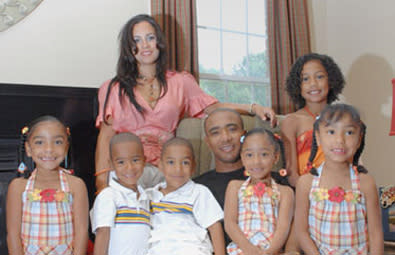Melvin Mora's many Moras
Normally, Melvin Mora's story gets told on Father's Day. He has 6-year-old quintuplets. Add his wife's 11-year-old daughter, whom they raise, and Mora is baseball's equivalent of Mike Brady.
"You should talk about the women in my life," he said.

The Mora quintuplets are 6 years old.
(Sabina Moran/Special to Yahoo! Sports)
OK. But where to start? There are two pillars, and it's not like Mora can choose a favorite, not on Mother's Day. This is a time to appreciate both: Felipa, the mother who raised him, and Gisel, the mother of his children. Mora figures the best way, aside from a gift and the promise of continued love, is to tell his story through them.
So it begins somewhere in the middle, in a hospital, where Gisel is bleeding and convinced she has lost her twins. She and Melvin met in 1997 in New Orleans, where he played Triple-A ball, and married three years later in New York. Gisel wanted more kids, and she underwent fertility treatment. Doctors thought she was carrying two babies until the bleeding started. They listened closer and heard five distinct heartbeats.
"I checked my wallet," Mora said. "Wanted to make sure I had enough money to feed them."
It brought him back to his youth in Venezuela. Mora grew up in Aqua Negra, his father, Gregorio, a beer and fruit salesman, his mother in charge of raising 10 children. Then, when Mora was 6, he watched as a man shot and killed his father at point-blank range. The man supposedly was angry with Gregorio's brother and mistook his identity.
"My mom had to provide for all of us," Mora said. "She worked in the streets selling everything. Bananas, lemons – fruit. She made sure we ate."
As Mora grew, his athleticism did likewise. He was the star of Venezuela's youth-soccer program and turned professional at 16. At a stadium in the Venezuelan city of Valencia, a plaque commemorates Mora once scoring 13 goals in a game.
Mora loved baseball, though, and the Houston Astros, with a monopoly on Venezuelan talent at the time, offered Mora $10,000 to sign. It was far more money than he had ever seen – more than Felipa could fathom.

Melvin and Gisel met when he was in the minors.
(Sabina Moran/Special to Yahoo! Sports)
After moving to the United States at 19, Mora fizzled out in the Astros organization. His teammates at Houston's Venezuelan academy, Bobby Abreu and Magglio Ordonez, had moved into starring outfield roles. Mora was a man without much power, without a position, seemingly without a future, so he spent about half a season in Taiwan to rebuild his reputation.
And a year later, there he was, in the big leagues, having accomplished his goal – and with no idea of what lay ahead July 28, 2001.
Gisel went into labor early. The Caesarean section took three minutes, and even though he had five times the babies as Alex Rodriguez, Mora did not pass out. On the contrary, he yearned to hold them. But they had to go into incubators, none of the five weighing more than 2½ pounds. They stayed there for months, Genesis, Rebekah, Jada, Christian and Matthew, allowing their lungs to develop and their bodies to fight off infections that hung around like unwanted freeloaders.
"Mentally, you get tired," said Mora, who less than a year earlier had been traded from the Mets to Baltimore. "I've been playing baseball all my life. That was easy. But when you sit there and wonder if one is going to pass away or something? They were able to survive because they're strong."
And they still are. Genesis is smart, especially for a first-grader, and cries the loudest. Rebekah is spoiled, a product, Mora posited, of being the first one to come home from the hospital. Jada is the leader of the five and, consequently, the one who gets in the most trouble. Christian makes everyone laugh and is the best baseball player, which excites Mora. Matthew likes computers and languages, the quint with the strongest grasp of English and Spanish.

The Mora kids relax at home.
(Sabina Moran/Special to Yahoo! Sports)
Though Mora enjoys cooking breakfast and lunch when he's home, he knows Gisel is the boss. She dresses the brood in matching uniforms and disciplines them when necessary because Mora said he tends to play his role as "papi," the affable, loves-everyone softie. With Mora spending half the year traveling, Gisel has been raising the quintuplets on her own, and with the occasional help of one nanny – which, after signing his first big contract for $10.5 million and his latest for $25 million that runs out in 2009, Mora could well afford.
Now there's no nanny. Gisel is in charge, and the kids – whom Mora said can sit on a plane for 2½ hours and utter nary a peep – recognize that.
"Without her, I couldn't do it," Mora said. "She controls everything. She organizes it all."
The chances of having quintuplets are 1 in 57 million, rarer, certainly, than a kid from a small Venezuelan town making it in the big leagues, though not by much. And so Mora calls Felipa, 67, every day to thank her for being his mother.
He bought her a house in Valencia, and he still is not sure he has done enough. Mora is getting the perspective that comes with age. He's 36. Gray hair is commingling with black. He's edging toward the end of his career. It still is fun. He smacked a home run Friday night, his fifth of the year, and he's hitting .259 with 21 RBIs.
"I love baseball," he said. "I really do.
"But without them, I wouldn't be here."
